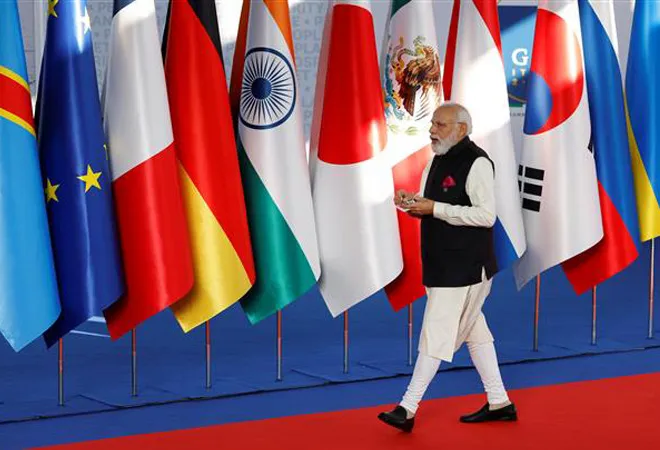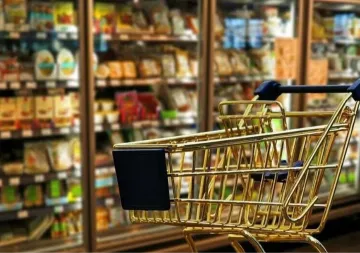
As India readies itself for the Presidency of the Group of 20 (G20),
from 1 December 2022 to 30 November 2023, it will need to go beyond merely setting the agenda around sharpening the economics of international engagements through politics, it will equally need to negotiate the politics of western pressures through economics. Neither of these is an easy challenge to negotiate. The increased polarisation and the accompanying whataboutery between democratic nations led by the United States (US) and authoritarian regimes coalescing around China are making the terrain more complex. Under these conditions, the success of India’s G20 Presidency will depend on how deftly Prime Minister Narendra Modi can find paths and instruments to bridge the divides, peace the conflicts, and rebuild damaged supply chains. Essentially, use the G20 to turn a planet plagued by differences into a platform of shared interests.
The success of India’s G20 Presidency will depend on how deftly Prime Minister Narendra Modi can find paths and instruments to bridge the divides, peace the conflicts, and rebuild damaged supply chains.
Confronting global challenges
Currently, there are five challenges plaguing the world that the G20 can attempt to fix. First and the most pressing is the in-your-face Russia–Ukraine conflict. Here, Modi needs to think creatively and sensitively to nudge both, the West and Russia, to retreat from battleground Ukraine. The exclusion of Russia from the G20,
as the West wants, is not possible; nor can the Russia–Ukraine conflict continue till perpetuity. The middle ground here is a strategic retreat for both—the West could put Ukraine’s North Atlantic Treaty Organisation (NATO) membership in cold storage as it is a red line for Russia, and Russia could be nudged to withdraw and give diplomacy its legitimate space. Nobody wants this conflict to widen into a broader war. This is easier said. But given that India has strong relationships with both the West and Russia, and the two are engaging only through the currencies of war and weapons, the importance of India’s role as a mediator to bring both out of the bloody stalemate cannot be understated. This will be the biggest challenge to, and if successful the greatest outcome of, India’s G20 presidency. Managing this would mean several rounds of behind-the-scenes talks with the US, the European Union (EU), and NATO on the one side, and Russia on the other. This is a role traditionally assigned to the United Nations (UN). The failure of the UN could be a trigger for India to take this up and catalyse the path to peace. If India can play its part to end the Russia–Ukraine conflict, it would have delivered what the entire Security Council has failed to.
If the first challenge is overcome, the second challenge, of rising prices, particularly of food and the resultant cascade into wider inflation across the world, will settle down on its own. If it does not, this challenge will need to be addressed separately.
Currently, the inflation rate in three out of 19 member nations is more than 10 percent; seven members have inflation rates of between 7.5 percent and 10 percent; five countries have an inflation rate of between 5 percent and 7.5 percent; four countries have an inflation rate of less than 5 percent. Comparing across economies, therefore, inflation is not yet a full-fledged common challenge for all G20 members. If the Russia–Ukraine conflict is not resolved, India will need to come up with new ideas to fix it.
India has strong relationships with both the West and Russia, and the two are engaging only through the currencies of war and weapons, the importance of India’s role as a mediator to bring both out of the bloody stalemate cannot be understated.
The third challenge is energy. Russia is teaching the world that while sanctions against it could impact its economy in the future, but in the short term, these sanctions are failing. The most vulnerable to Russia’s reaction are the gas-dependent European nations. Sitting in the hot climes of July, the problem may seem distant. Come November, the shortage of gas in countries such as Germany will play out differently. The hot virtue-signalling economics will change, but more importantly, the cold politics of discomfort—an idea that’s new to Europe—will implode. Shifting the blame, to India for instance for buying statistically-insignificant quantities of oil from Russia, will only expose the hypocrisy of the West; it will not deliver solutions. On this front, India needs to transport three disparate G20 energy interests—broadly, energy producers (the US, Russia, and Saudi Arabia) versus energy consumers (Europe and others)—on a working platform.
As rising food and energy prices lead to inflation, the fourth challenge is the manner in which countries are attempting to fix the problem. In democracies, high prices can cause political instability. Containing prices at any cost is not an economic necessity, it is equally a political priority. Using the blunt tool of monetary policy, the default policy knee-jerk, most central banks have been raising interest rates. This may curb excess consumption, but leaves the supply-side problem unaddressed. Other than China, Indonesia, Japan, Russia, and Türkiye, the central banks of all other G20 members have
raised interest rates recently. This will increase the cost of doing business across the board and will slow down investments—without making a dent in primary inflation. India needs to set the G20 agenda that catalyses the creation of new food supply chains, while managing immediate food shortages, to contain inflation. Simultaneously, it must strengthen the growth argument, one aspect of which is lower interest rates.
India needs to transport three disparate G20 energy interests—broadly, energy producers (the US, Russia, and Saudi Arabia) versus energy consumers (Europe and others)—on a working platform.
The fifth challenge is the threat of stagflation—the slowing or stagnation of economic growth going hand in hand with rising inflation. In developed countries, this shows up as a fall in consumption as households in the expectation of rising prices curtail their purchases, which, in turn, slows growth. The policy solution for this is easy—hand out cash to households. But in developing economies, the scope for the consumption-growth equation is limited, resources in the hands of governments are few, and the ability to hand out cash is difficult. Food distribution in food-sufficient economies, such as India, is the resultant policy action. India will need to put this issue on the G20 table and ensure that the grouping pays extra attention to food-short economies. If government pump priming is necessary, the condition is that green shoots of growth must be visible.
All other debates such as greening the planet or making technology platforms more accountable to sovereigns will follow. Once the big challenges have been addressed, these will become easier to deliver. The 100 official meetings around employment, health, digital economy, trade, investment, climate, anti-corruption, tourism, culture, socio-economic development, education, and women empowerment will continue to stay on course. As will the 50 academic interactions and 40 meetings around the international financial architecture, financial inclusion and sustainable finance, financing for infrastructure, climate finance, and tax matters. These conversations must continue, even as the bigger problems take priority.
The 100 official meetings around employment, health, digital economy, trade, investment, climate, anti-corruption, tourism, culture, socio-economic development, education, and women empowerment will continue to stay on course.
Finally, over the past 13 years, there has been a temptation to bring a unique
sovereign signature on all G20 Leaders’ communiques. What began with a sharp focus on the economy in the November 2008 Washington Summit began to get fuzzy by the April 2009 London Summit with an expansion to “build an inclusive, green, and sustainable recovery”. The September 2009 Pittsburgh Summit included climate change, while the November 2010 Seoul Summit introduced the millennium development goals, marine environment protection, and corruption into the G20 discourse. The November 2014 Brisbane Summit urged the World Bank and the International Monetary Fund to budget US$ 300 million for the outbreak of Ebola in Guinea, Liberia, and Sierra Leone, while the November 2015 Antalya Summit had a statement on the fight against terrorism.
The primary goal of the G20 was to act as the board of directors of the global economy. That it has expanded the mandate to include more issues shows a rising legitimacy of the G20. But it also shows governments bending before the narrow interests of those with zero skin in the game wanting to hijack such agendas. Resisting the temptation to further dilute the mandate of the G20 will remain an invisible challenge for all presidencies, including India’s.
The views expressed above belong to the author(s). ORF research and analyses now available on Telegram! Click here to access our curated content — blogs, longforms and interviews.



 As India readies itself for the Presidency of the Group of 20 (G20),
As India readies itself for the Presidency of the Group of 20 (G20),  PREV
PREV


